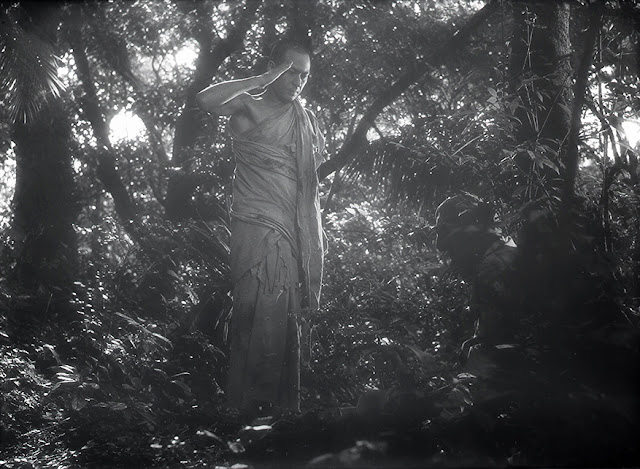 |
| Shoji Yasui in The Burmese Harp |
Pvt. Mizushima: Shoji Yasui
Ito: Jun Hamamura
Kobayashi: Taketoshi Naito
Maki: Shunji Kasuga
Baba: Ko Nishimura
Oyama: Tomio Aoki
Old Woman: Tanie Kitabayashi
Director: Kon Ichikawa
Screenplay: Natto Wada
Based on a novel by Michio Takeyama
Cinematography: Minoru Yokayama
Film editing: Masanori Tsujii
Music: Akira Ifukube
No film that contains as many reprises of Henry Bishop's old parlor song "Home, Sweet Home" as Kon Ichikawa's The Burmese Harp does can escape charges of sentimentality. It's sung in both Japanese and English by male choruses accompanied by the titular harp -- which sounds a lot more like a full-size orchestral harp than the smaller Burmese saung that appears on the screen. But although the film contains scenes of the carnage of war, Ichikawa is clearly not aiming for realism here. The source of the film was a novel serialized in a children's magazine in 1946 that became an adult bestseller when it was published as a book. The book was designed as antiwar statement, a corrective to the militarism that had plunged Japan into disaster, and Ichikawa's film, which elaborates on the book's themes of Buddhist pacifism, still retains some of the power to stir sentiments in that direction. It focuses on Mizushima, member of a company of Japanese soldiers led by Capt. Inouye, who had been a music teacher before by war and tries to keep up morale as they trek through the Burmese jungle by having the men sing. Mizushima has found a harp and learned to play it extremely well, accompanying the singing as well as using the harp when he goes on reconnaissance missions, playing one tune for "all clear" and another for "danger." When the war ends, the company is sent to a temporary prison camp, from which Mizushima is sent out to try to persuade a recalcitrant group of Japanese soldiers that the war is over and they should surrender. The fanatics refuse, but Mizushima is unable to leave their hillside stronghold before the deadline passes and the place is shelled, killing most of the holdouts and leaving Mizushima unconscious. The company moves on, thinking Mizushima dead, and are about to be repatriated when they discover that he has survived. A flashback tells how Mizushima became a Buddhist monk, so devoted to the task of burying the Japanese corpses that still remain in the Burmese countryside that he refuses to return to Japan. The Burmese Harp is beautifully filmed by Minoru Yokayama, and became an international hit. There have been charges that the film "whitewashes" the Japanese campaign in Burma, ignoring atrocities committed under orders from the Japanese high command, and this criticism deserves to be heard. But the underlying antiwar fable of the film still holds its strength.